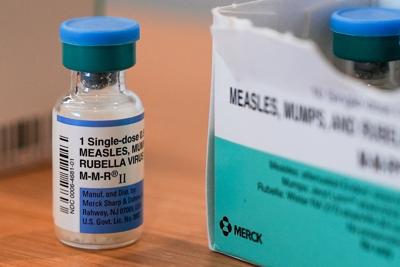COLUMBUS, Ohio “““Į╩ėŲĄö A measles outbreak has been confirmed in “““Į╩ėŲĄhtabula County, Ohio, Ohio Department of Health Director Bruce Vanderhoff said Wednesday.
In addition, the state has one confirmed case of a visitor to Knox County who exposed others to measles there and in nearby counties.
ODH and “““Į╩ėŲĄhtabula County have identified 10 measles cases. Nine are linked to a man reported last week as the state“““Į╩ėŲĄÖs first measles case of 2025. None of the individuals were vaccinated, according to ODH.
“““Į╩ėŲĄ£Given the measles activity in Texas, New Mexico, and other states around the country, we“““Į╩ėŲĄÖre disappointed but not surprised we now have several cases here in Ohio and known exposure in some counties,“““Į╩ėŲĄØ Vanderhoff said in a news release. “““Į╩ėŲĄ£This disease can be very serious, even deadly, but it is almost entirely avoidable by being properly vaccinated.
“““Į╩ėŲĄ£Measles is especially dangerous for young children, so I strongly urge all parents across Ohio to make sure your children are vaccinated. It is a crucial layer of protection that can save lives.“““Į╩ėŲĄØ
The state health department is working with health departments in “““Į╩ėŲĄhtabula and Knox counties to follow up on potential exposures and to promote vaccination.
The Centers for Disease Control and Prevention (CDC) defines a measles outbreak as three or more related cases. Measles can spread quickly, and each case can lead to an additional 12 to 18 cases if people aren“““Į╩ėŲĄÖt protected against the disease.
The CDC reported 378 cases nationwide as of March 20, according to the release.
Ohio had 90 cases of measles in 2022, when an outbreak in central Ohio totaled 85 cases. The state had one measles case in 2023 and seven in 2024.
About measles
Measles is extremely contagious and can spread to others through coughing and sneezing. It can be transmitted by people who travel to places where measles is spreading. If people are not protected against the disease, nine out of 10 people who are exposed will become ill.
Two doses of the measles vaccine (called MMR as it protects against measles, mumps and rubella) is 97% effective against measles. For those who are up-to-date on measles vaccine, the risk of getting sick is extremely low.
The CDC recommends all children get two doses of MMR vaccine, starting with the first dose at 12 through 15 months of age, and the second dose at 4 through 6 years of age.
In most instances, adults who were vaccinated against measles as children do not need any additional doses as adults; however, adults who did not receive the MMR vaccine as children or those who are unsure about their vaccination status are encouraged to talk to their health care provider.
Those born before 1957 are likely protected by previous infection.
Symptoms of measles
The measles virus can live for up to two hours in air where an infected person coughed or sneezed. If other people breathe the contaminated air or touch an infected surface and then touch their eyes, noses, or mouths, they can become infected. People infected with measles can spread it to others from four days before, through four days after a rash appears.
Measles symptoms include:
- Rash
- High fever
- Runny nose
- Cough
- Loss of appetite
- Red, watery eyes
The rash usually lasts five to six days and begins at the hairline, moves to the face and upper neck, and proceeds down the body. Diarrhea and ear infections are common complications of measles. More severe complications may also occur.
“““Į╩ėŲĄ many as one out of every 20 children with measles gets pneumonia, the most common cause of death from measles in young children.













